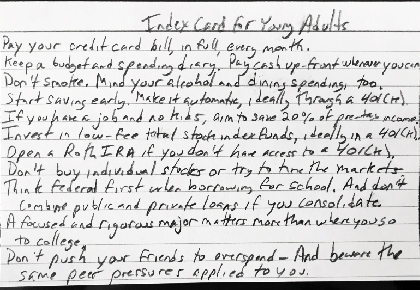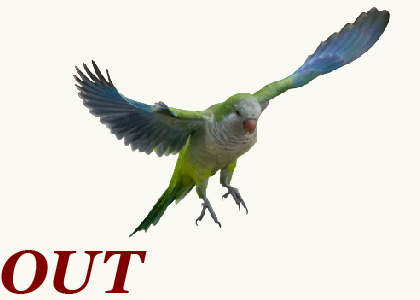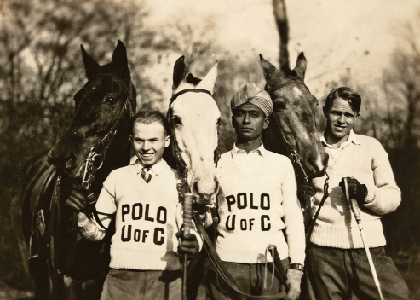|
|
|
|
|
|
| How to get your $$$ in order before you turn 30 |
|
| |
|
| All the personal finance advice you need would fit on an index card, Harold Pollack quipped in a 2013 interview. Immediately people wanted to know: Where's the card? |
| |
| So Pollack, the Helen Ross Professor in the School of Social Service Administration, scribbled down some ideas and posted a photo, which went viral. |
| |
| For College Review, Pollack created a new index card specifically for recent graduates (and anyone else who needs to get their finances in order). |
|
|
| |
|
|
|
|
|
|
|
What's in? What's out?
(bird edition) |
|
| |
|
|
|
| Peregrine falcons (Falco peregrinus) |
|
| |
|
| Once on the endangered species list, now making a slow comeback. In past years, the cliff-dwelling peregrines hung around Rockefeller Chapel. This year, the social sciences quad is the place to be seen. The nearest known nest is on a water intake crib at 68th Street. |
|
| |
|
|
|
| Monk parakeets (Myiopsitta monachus) |
|
| |
|
| Since the 1960s, these pet-trade escapees added to the eccentricity of Hyde Park. But there are no more parakeet nests in the neighborhood. Meanwhile the suburban population is increasing. No one knows why. |
| |
| Did the peregrines eat all the parakeets? "Absolutely not," says ecology professor Stephen Pruett-Jones. A parakeet could easily break a peregrine's leg with its sharp beak. |
|
|
| |
|
|
|
|
|
The Renaissance was
really terrible, actually |
|
| |
|
| "The Renaissance is a period we romanticize, but it was so much worse than the so-called Dark Ages," says Ada Palmer, assistant professor, Department of History and the College. |
| |
| "Our Renaissance is cathedrals and Raphaels and Michelangelos, and that's all true, but the average life expectancy in Renaissance Florence was 18. In the Middle Ages it had been closer to 35. |
|
| |
|
|
|
| "Faster trade means diseases spread more rapidly. More wealth means armies get larger and are better equipped. Wars are deadlier. More prosperous cities cram more people into a small area with higher-stakes politics, which leads to more murder, more street violence. The lived experience felt apocalyptic. In many ways, all of the wonderful stuff--the glitter and cathedrals and new revolutionary ideas--are the fruits of people's desperation. |
| |
| "At the Renaissance Society of America last year, I was at a dinner with 12 others: three art historians, the rest historians. Somebody asked: If you had a time machine, would you go back? All the art historians said yes. All the historians said no." |
| |
| Live in Chicago? See the exhibit Tensions in Renaissance Cities, cocurated by Palmer, at the Special Collections Research Center Exhibition Gallery through June 9. Learn more » |
|
| |
|
|
|
America's least wanted ...
book donations |
|
| |
|
| Arline Welty, AB'04, cofounded Chicago Books to Women in Prison 15 years ago, when she was a second-year. |
| |
| Now a registered nonprofit, CBWP mailed more than 9,000 books and 500 blank journals directly to prisoners in 2016. The most popular requests: dictionaries and composition books. |
| |
| The organization relies on donated paperbacks, but not all donations are as welcome as others. Asked for a list of especially undesirable books, CBWP's president, Vicki White, AB'79, sent us this compendium. |
|
| |
|
|
|
| Chicken Soup for the Golfer's Soul made CBWP's 2013 list. "As far as I know," says Welty, "there are no golf courses in prison." |
|
| |
|
Cracking the GMAT/GRE/LSAT
Only about 40 percent of people in prison have a high school diploma. Some want to study for a GED in prison, so we'll send more than 300 GED review books this year. |
| |
Anything by Émile Durkheim
Why do people give us Durkheim? For some reason Ethics and the Sociology of Morals seems to get donated, but no thank you. |
| |
Anything on the power of decluttering to change one's life
Clutter tends not to be a problem in prison. |
| |
The Internet for Dummies (1994)
We're getting more requests for technology books--coding, web design--but not from an antiquarian perspective. |
| |
Eat Pray Love and similar books
Many people seem to think women in prison will be moved and delighted by stories of well-to-do women on a "search for everything." |
| |
Fad diets and cure-alls
Good nutrition and health care are hard to come by in prison, but books like these aren't the answer. |
| |
Puzzle books and workbooks that are all filled in
C'mon, people. What were you thinking? |
|
| |
|
|
|
|
|
NSP@40:
Please show your work |
|
| |
|
| The Neighborhood Schools Program, founded in 1976-77, celebrates its 40th anniversary this academic year. |
| |
| When NSP started, it sent UChicago students to tutor at two local schools, Ray Elementary and Kenwood Academy. Now there are more than 400 students at 50 public schools and community centers working as tutors, as teaching assistants, and in administrative support. |
|
| |
|
|
|
| Did you participate in NSP? If so, director Shaz Razul, AB'97, SM'08, would like to hear from you. |
|
| |
|
|
|
|
|
|
|
|
|
| From the archive: Chandra Dharma Sena Gooneratne, PhB'27, AM'28, PhD'33, with other members of UChicago's polo team, circa 1926. |
| |
| Miscellaneous topics we've been mulling lately: "Je suis" and other things French people never say. Hanna Holborn Gray, age 3, fled Germany with her family to escape the Nazis. "Leadbelly v. Lomax at the Modern Language Association Conference, 1934" by 2017 Pulitzer Prize winner Tyehimba Jess, AB'91. Why is the bust of Silas J. Cobb displayed in such an odd location? |
| |
| ICYMI--Most read in the last Core: "C-list celebrity" Misha Collins, AB'97 and his signature recipe, Pasta with Jam Sauce. |
|
| |
|








